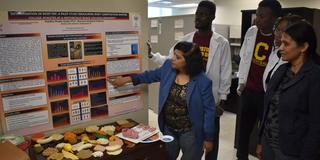
Obesity, diet, cardiovascular disease: Six questions for the researcher

Researching obesity, cardiovascular diseases, health, diet, and nutrigenomics in Ohio
Pratibha Gupta, Ph.D., is a research associate professor of food, nutrition, and health and Extension specialist for Family and Consumer Science at Central State University. She is an editorial member for the National Consortium for Building Healthy Academic Communities and the Journal of Current Trends in Nutrition. She is also on the five-member Board of Directors of the Food Distribution Research Society.

Gupta recently responded to a list of questions by Cyril Ibe on her $600,000, USDA-funded research titled, “Nutrition Education and Outreach Program to Address and Prevent Obesity in Minority Communities: Application of Nutrigenomics.” The following has been lightly edited for clarity.
Gupta is the principal investigator (PI) for the study, which involves Central State in partnership with Kentucky State University, Lincoln University, and the University of Toledo.
Q: What is the definition of nutrigenomics, and what are the goals of your ongoing, three-year study?
A: Simply it is the food and gene interaction and how it impacts our body. Our lab is going to develop a personalized nutritional plan based on their nutritional genome profile. Nutrigenomics can be defined as the interaction between nutrition and an individual's genetic pattern. This project will address the issue of obesity prevention by assisting minority adults to adopt and model healthy, personalized lifestyle choices through dietary advice on eating patterns and the intervention program Simply My Health (S.M.H.) being developed at Central State University, thereby providing healthier foods and exercise behaviors.
Q: Your study’s focus is on minority populations and some specific health outcomes. What communities are you targeting, and why so?
A: The project goals deal with research experimentation and extension education to identify specific African American and underrepresented minority adults (18 years and older), particularly those who are suffering from being overweight.
Q: Specifically, what methods is your study undertaking to investigate obesity, overweight conditions, cardiovascular diseases, and diabetes in Ohio?
A: All the participants will go through two sets of assessments 1. Bioelectric Impedance Assessment (BIA Technology) to assess the entire body composition. 2. Nutritional genetic profile to identify the lifestyle and suggest a specific, personalized nutritional plan to follow in order to address the issue of obesity.
Q: How are you recruiting participants for your study? Are you still accepting participants, and if so, how can one become enrolled in the study?
A: The recruitment process will be simple. We will advertise via the Central State University Public Relations office. We have a team in the lab to help in recruiting.
Nutrigenomics can play a crucial role in obesity prevention. By examining an individual's genetic makeup, nutrigenomics can identify potential risks and help tailor a personalized diet plan to prevent the onset of the disease. ... Overall, nutrigenomics offers a promising avenue for disease prevention and personalized nutrition.
Q: Regardless of whether one participates in your study, are there things we should all keep in mind about our diet, nutrition, our body, genes, and our overall health?
A: Nutrigenomics can play a crucial role in obesity prevention. By examining an individual's genetic makeup, nutrigenomics can identify potential risks and help tailor a personalized diet plan to prevent the onset of the disease. This approach considers an individual's unique nutritional needs based on their genetic profile, helping them make informed choices about what they eat. Additionally, nutrigenomics can help identify foods that may trigger adverse reactions or exacerbate symptoms in individuals with diabetes, allowing for better disease management. Overall, nutrigenomics offers a promising avenue for disease prevention and personalized nutrition.
Q: What tangible benefits/results do you hope to see in your targeted communities at the end of your study, and how do you plan to share the benefits with them?
A: The interactions and identification of diet-gene will allow us to develop a specialized, personalized dietary intervention that will lead to evidence-based lifestyle and dietary strategies for achieving health and fitness and anticipate the effects of genetic factors in preventing diet-related diseases. Incorporation and considerations of introducing a successful launch of personalized nutrigenomic foods could be the new trends in preventing future diseases. Developing a specialized, personalized nutrigenomic food will depend on an individual's nutritional and genetic tests for participants to follow.
Research team
Avinash Tope, Ph.D. (Kentucky State University)
Michael Toland, Ph.D. (University of Toledo)
Sarah Eber (Lincoln University)
Mortenous Johnson (Central State University)
Dr. Achint Choksy (ACE Integrative Health)
Student researchers
Edmond Kollie
Raymond Rolle
Vandeleezza Hepburn


